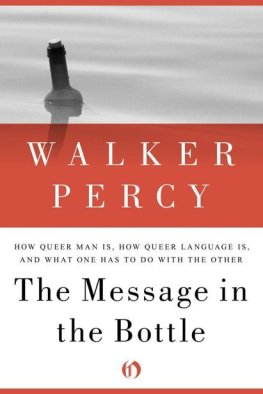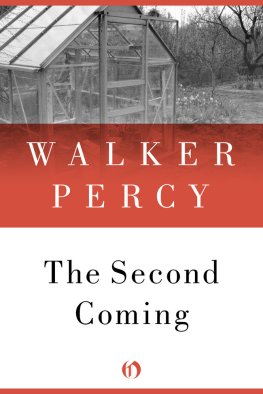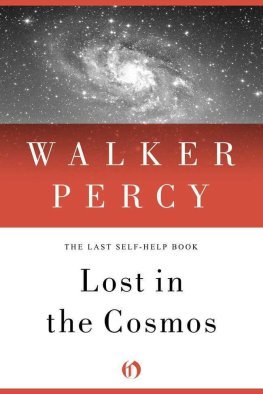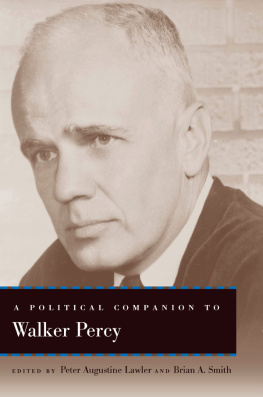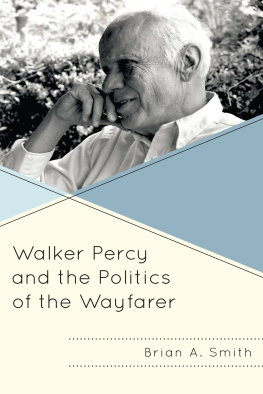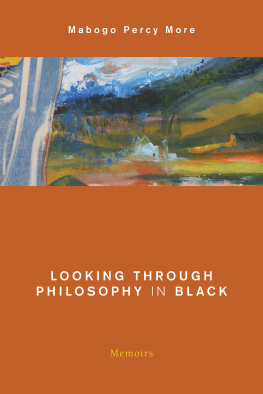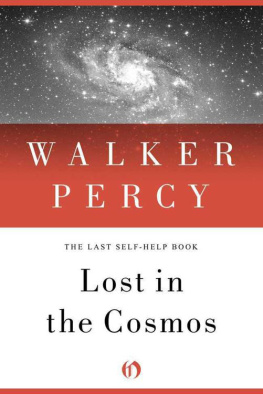Walker Percy
The Message in the Bottle: How Queer Man Is, How Queer Language Is, and What One Has to Do with the Other
This book was twenty years in the writing. All chapters except the last appeared as articles in journals. One chapter was published in 1954, another in 1975. Since my recurring interest over the years has been the nature of human communication and, in particular, the consequences of mans unique discovery of the symbol, a certain repetitiveness in the articles is inevitable. Some of the repetition has been preserved here, for example, the Helen Keller phenomenon, if for no other reason as evidence at least of the longevity of my curiosity and my inability to get rid of it. This particular bone, I thought, needed worrying.
Grateful acknowledgment is made to the editors of the following journals for their permission to reprint the articles: The Southern Review, University of Houston Forum, Sewanee Review, Partisan Review, Katallagete, Thought, Psychiatry, The New Scholasticism, The Modern Schoolman, The Journal of Philosophy, Philosophy and Phenomenological Research.
How I Discovered the Delta Factor Sitting at My Desk One Summer Day in
Louisiana in the 1950s Thinking about an Event in the Life of Helen Keller on
Another Summer Day in Alabama in 1887
In the beginning was Alpha and the end is Omega, but somewhere between occurred Delta, which was nothing less than the arrival of man himself and his breakthrough into the daylight of language and consciousness and knowing, of happiness and sadness, of being with and being alone, of being right and being wrong, of being himself and being not himself, and of being at home and being a stranger.
WHY DOES MAN feel so sad in the twentieth century?
Why does man feel so bad in the very age when, more than in any other age, he has succeeded in satisfying his needs and making over the world for his own use?
Why has man entered on an orgy of war, murder, torture, and self-destruction unparalleled in history and in the very century when he had hoped to see the dawn of universal peace and brotherhood?
Why do people often feel bad in good environments and good in bad environments?
Why do people often feel so bad in good environments that they prefer bad environments?
Why does a man often feel better in a bad environment?
Why is a man apt to feel bad in a good environment, say suburban Short Hills, New Jersey, on an ordinary Wednesday afternoon? Why is the same man apt to feel good in a very bad environment, say an old hotel on Key Largo during a hurricane?
Why have more people been killed in the twentieth century than in all other centuries put together?
Why is war mans greatest pleasure?
Why is man the only creature that wages war against its own species?
What would man do if war were outlawed?
Why is it that the only time I ever saw my uncle happy during his entire life was the afternoon of December 7, 1941, when the Japanese bombed Pearl Harbor?
Why did he shortly thereafter become miserable when he learned that he was too old to go to Europe to shoot at Germans and stand a good chance of being shot by Germans?
Why is it that the only time he was happy before was in the Argonne Forest in 1918 when he was shooting at Germans and stood a good chance of being shot by Germans?
Why was he sad from 1918 to 1941 even though he lived in as good an environment as man can devise, indeed had the best of all possible worlds in literature, music, and art? Why is it that a man riding a good commuter train from Larchmont to New York, whose needs and drives are satisfied, who has a good home, loving wife and family, good job, who enjoys unprecedented cultural and recreational facilities, often feels bad without knowing why?
Why is it that if such a man suffers a heart attack and, taken off the train at New Rochelle, regains consciousness and finds himself in a strange place, he then comes to himself for the first time in years, perhaps in his life, and begins to gaze at his own hand with a sense of wonder and delight?
What is the difference between such a man, a commuter who feels bad without knowing why, and another commuter who feels bad without knowing why but who begins to read a book about a man who feels bad without knowing why?
Why does it make a man feel better to read a book about a man like himself feeling bad?
Why was it that Jean-Paul Sartre, sitting in a French caf and writing Nausea, which is about the absurdity of human existence and the nausea of life in the twentieth century why was he the happiest man in France at the time?
Why was it that when Franz Kafka would read aloud to his friends stories about the sadness and alienation of life in the twentieth century everyone would laugh until tears came?
Why is it harder to study a dogfish on a dissecting board in a zoological laboratory in college where one has proper instruments and a proper light than it would be if one were marooned on an island and, having come upon a dogfish on the beach and having no better instrument than a pocketknife or bobby pin, one began to explore the dogfish?
Why is it all but impossible to read Shakespeare in school now but will not be fifty years from now when the Western world has fallen into ruins and a survivor sitting among the vines of the Forty-second Street library spies a moldering book and opens it to The Tempest?
Why is it difficult to see a painting in a museum but not if someone should take you by the hand and say, I have something to show you in my house, and lead you through a passageway and upstairs into the attic and there show the painting to you?
Why are Americans intrigued by the idea of floating down the Mississippi River on a raft but not down the Hudson?
Why do more people commit suicide in San Francisco, the most beautiful city in America, than in any other city?
Why is the metaphor Flesh is grass, which is not only wrong (flesh is not grass) but inappropriate (flesh is not even like grass), better and truer than the sentence Flesh is mortal, which is quite accurate and logical?
What would you do if a stranger came up to you on a New York street and, before disappearing into the crowd, gave you a note which read: I know your predicament; it is such and such. Be at the southeast corner of Lindell Boulevard and Kingshighway in St. Louis at 9 a.m., April 16I have news of the greatest importance?
Where are the Hittites?
Why does no one find it remarkable that in most world cities today there are Jews but not one single Hittite, even though the Hittites had a great flourishing civilization while the Jews nearby were a weak and obscure people?
When one meets a Jew in New York or New Orleans or Paris or Melbourne, it is remarkable that no one considers the event remarkable. What are they doing here? But it is even more remarkble to wonder, if there are Jews here, why are there not Hittites here?
Where are the Hittites? Show me one Hittite in New York City.
Given two men living in Short Hills, New Jersey, each having satisfied his needs, working at rewarding jobs, participating in meaningful relationships with other people, etc., etc.: one feels good, the other feels bad; one feels at home, the other feels homeless. Which one is sick? Which is better off?
Why do people driving around on beautiful Sunday afternoons like to see bloody automobile wrecks?
Why did the young French couple driving through the countryside with their baby, having heard the news of a crash nearby of an airliner killing three hundred people and littering the forest with bits of flesh, speed frantically toward the scene, stop the car, and, carrying the baby, rush toward the dead, running through thickets to avoid police barricades? Did they have relatives on the plane?

